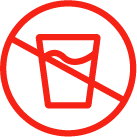This information will help you get ready for your procedure to place the ZepHr pH monitoring system at Memorial Sloan Kettering (MSK). It also explains what to do during your ZepHr pH monitoring system test.
About the ZepHr pH Monitoring System
The ZepHr pH monitoring system measures reflux. Reflux is when your stomach contents move out of your stomach and back up your esophagus (food pipe).
Your healthcare provider may ask you to do this test if you:
- Have acid reflux (heartburn)
- Regurgitate food and liquids (burp foods and liquids into your mouth after eating or drinking)
- Have reflux that isn’t helped by medications to prevent it
- Are thinking about having surgery to stop your reflux
The ZepHr system has 2 parts:
- A long, thin probe. The probe is placed through your nose and esophagus into your stomach.
- A recorder. You’ll wear the recorder on a strap around your neck. The probe connects to the recorder.
The ZepHr system will stay in place for 24 hours. During this time, you’ll use the recorder to keep track of your meals, body position, and symptoms. You can go home and do most of your usual activities while the probe is in place.
About Your ZepHr Probe Placement
There are 2 ways a ZepHr probe can be placed. Your healthcare provider will tell you how yours will be placed.
ZepHr probe placement with esophageal manometry
An esophageal manometry (ee-SAH-fuh-JEE-ul muh-NOM-uh-tree) is a test that measures the pressure in your esophagus. This will help your healthcare provider decide exactly where to place the ZepHr probe. The test doesn’t hurt.
You won’t need anesthesia if you’re having your ZepHr probe placed with esophageal manometry. Anesthesia is medication to make you sleep during a procedure. You can go home by yourself after your procedure.
ZepHr probe placement with upper endoscopy
During an upper endoscopy (en-DOS-koh-pee), your healthcare provider will look inside your esophagus, stomach, and the first part of your small intestine using an endoscope. An endoscope is a thin, flexible tube with a video camera at the end.
If you’re having your ZepHr probe placed with an upper endoscopy, you’ll get anesthesia during your procedure. Anesthesia is medication to make you sleep during a procedure. You’ll need to have a responsible care partner take you home after your procedure.
Before Your Procedure
Ask about your medications
Medication for acid reflux
If you take a proton-pump inhibitor (PPI) or H2 blocker, stop taking it 7 days before your procedure. These medications are used to control acid reflux. The following table lists examples.
| Common PPI medications | Common H2 blocker medications |
|---|---|
|
|
If your healthcare provider gives you different instructions, follow those instead.
Medication for diabetes
If you take insulin or another medication for diabetes, you may need to change the dose on the day of your procedure. This is because you can’t eat after midnight the night before your procedure.
Ask the healthcare provider who prescribes your diabetes medication what to do the day before and the morning of your procedure.
Arrange for someone to take you home, if needed
If you’re having your ZepHr pH probe placed with an upper endoscopy, a responsible care partner must take you home after. A responsible care partner is someone who can help you get home safely. They should be able to contact your care team if they have any concerns. Make sure to plan this before the day of your procedure.
If you don’t have a responsible care partner to take you home, call one of the agencies below. They’ll send someone to go home with you. There’s often a charge for this service, and you’ll need to provide transportation. It’s OK to use a taxi or car service, but you still need a responsible care partner with you.
| Agencies in New York | Agencies in New Jersey |
| VNS Health: 888-735-8913 | Caring People: 877-227-4649 |
| Caring People: 877-227-4649 |
3 days before your procedure
An endoscopy nurse will call you 3 to 5 days before your procedure. They will:
- Review the instructions in this guide.
- Ask about your medical history and the medications and you take.
- Tell you which medications to take the morning of your procedure.
1 day before your procedure
Note the time of your procedure
A staff member from the Admitting Office will call you after the day before your procedure. If your procedure is scheduled for a Monday, they’ll call you on the Friday before.
The staff member will tell you what time to arrive at the hospital for your procedure. They’ll also remind you where to go. If you don’t get a call by , call 212-639-7882.
If you need to cancel your procedure for any reason, call the healthcare provider who scheduled it.
Instructions for eating and drinking: 8 hours before your arrival time
|
The Day of Your Procedure
Remember, don’t eat anything after midnight the night before your procedure. This will help keep you from vomiting (throwing up) while the probe is placed.
Instructions for drinking: 2 hours before your arrival time
| Stop drinking 2 hours before your arrival time. This includes water. |
Things to remember
- Only take the medications your nurse told you to take the morning of your procedure. Take them with a few sips of water.
- Don’t put on any lotion, cream, deodorant, makeup, powder, perfume, or cologne.
- Don’t wear any metal objects. Remove all jewelry, including body piercings.
- Leave valuable items (such as credit cards and jewelry) at home.
- If you wear contact lenses, wear your glasses instead.
What to bring
- A list of the medications you take at home, including patches and creams.
- Your rescue inhaler (such as albuterol for asthma), if you have one.
- A case for your glasses.
- Your Health Care Proxy form and other advance directives, if you’ve filled them out.
Where to park
MSK’s parking garage is on East 66th Street between York and 1st avenues. If you have questions about prices, call 212-639-2338.
To get to the garage, turn onto East 66th Street from York Avenue. The garage is about a quarter of a block in from York Avenue. It’s on the right (north) side of the street. There’s a tunnel you can walk through that connects the garage to the hospital.
There are other parking garages on:
- East 69th Street between 1st and 2nd avenues.
- East 67th Street between York and 1st avenues.
- East 65th Street between 1st and 2nd avenues.
Paid valet parking is available at the David H. Koch Center for Cancer Care.
Where to go
Your procedure will take place at one of these locations:
David H. Koch Center
530 East 74th Street
New York, NY 10021
Take the elevator to the 8th floor.
1275 York Avenue (between East 67th and East 68th Streets)
New York, NY 10065
Take the B elevator to the 2nd floor. Turn right and enter the Endoscopy/Surgical Day Hospital Suite through the glass doors.
What to expect
Many staff members will ask you to say and spell your name and date of birth. This is for your safety. People with the same or a similar name may be having a procedure on the same day.
When it’s time to change for your procedure, you’ll get a hospital gown to wear.
After changing into a hospital gown, you’ll meet your nurse. They’ll check your heart rate, breathing, and blood pressure. If you’re getting anesthesia during your procedure, they’ll also place an intravenous (IV) line into one of your veins. They usually use a vein in your hand or arm. At first, you’ll get fluids through the IV. Later, you’ll get your anesthesia through your IV.
You’ll also meet with your doctor before your procedure. They’ll explain the procedure and answer your questions. They’ll also ask you to sign a consent form if you haven’t already. When it’s time for your procedure, a staff member will wheel your bed into the procedure room.
If you’re getting anesthesia, a nurse will hook you up to equipment. It will keep track of your heart rate, breathing, and blood pressure. You’ll also get oxygen through a thin tube that rests below your nose. After the equipment and oxygen are in place, you’ll get anesthesia through your IV.
Once you’re ready, you’ll have an esophageal manometry or upper endoscopy. After that, your doctor will put the ZepHr probe through your nose, into your stomach. They’ll tape it to your nose to keep it in place. They’ll also attach it to the recorder.
After Your Procedure
In the hospital
If you got anesthesia during your procedure, you’ll wake up in the Post Anesthesia Care Unit (PACU). Your nurse will still be keeping track of your heart rate, breathing, and blood pressure. Once you’re fully awake, they’ll remove your IV. If you have someone waiting with you, your nurse will explain your discharge instructions to both of you.
If you didn’t get anesthesia during your procedure, you can go home right after your procedure.
At home
You shouldn’t have any pain after your procedure. You may still feel sleepy if you got anesthesia.
While You Have the ZepHr pH Monitoring System
- Don’t take a shower or bath. The recorder and probe can’t get wet.
-
Eat and drink the things you normally do.
- Don’t chew gum or suck on throat lozenges or candy. These foods will affect the test results.
- Keep doing your usual activities, including working and exercising. Try to do activities that will bring on your symptoms.
- Sleep as flat as possible, even if you usually sleep propped up. You can sleep on your side or back. It’s best not to sleep on your stomach.
- Don’t take your acid reflux medications (PPI or H2 blockers) during the test unless your doctor tells you to.
Use the ZepHr recorder
The ZepHr recorder will be attached to the ZepHr probe by a wire. It’s important to keep the recorder close to you at all times. Wear it around your neck while you’re awake. Put it under your pillow when you sleep.
Use the buttons to record your body position, meals, and symptoms.
- Press the up button when you sit or stand up.
- Press the down button when you lie down.
- Press the knife and fork when you start a meal.
- Press the knife and fork with an X through them when you end a meal.
- Press the symptom buttons when you have symptoms. Your care team will program the buttons based on the symptoms you have most often.
Your care team will also give you a diary. Record your symptoms in the diary if:
- You have a symptom that isn’t programmed into your ZepHr recorder.
- You have a symptom but forget to press a button on your ZepHr recorder.
It’s important to accurately record your body position, meals, and symptoms in your recorder or diary. This will help your healthcare provider learn the most about your symptoms.
Follow-up appointment
You’ll have an appointment with the healthcare provider who placed your ZepHr probe 24 hours after your procedure. During this appointment, your nurse will remove the probe and the recorder.
If you recorded anything in your diary, bring it to this appointment. Give it to your nurse.
When to Call Your Healthcare Provider
Call your healthcare provider if you have:
- A fever of 101 °F (38.3 °C) or higher
- Very bad or constant stomach pain, hardness, or bloating
- Very bad or constant chest pain
- Trouble swallowing
- Nausea (feeling like you’re going to throw up) or vomiting, including stomach contents or blood
- Very bad or constant bleeding from your nose
- Any unexplained or unexpected problems

